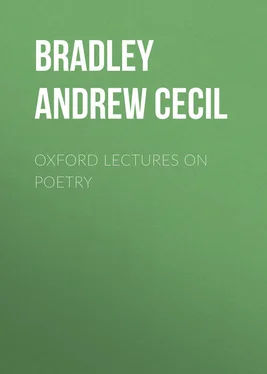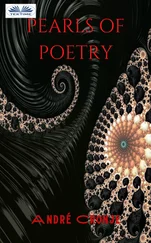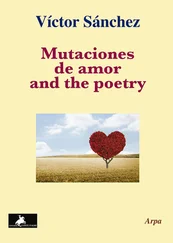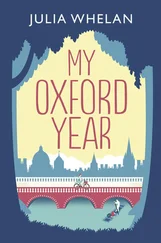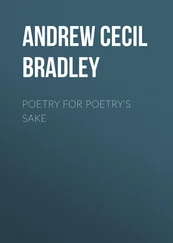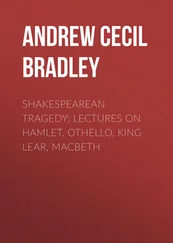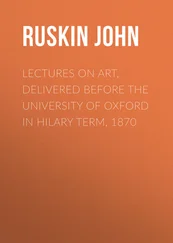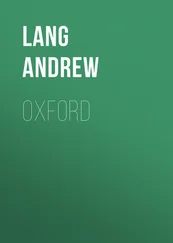Andrew Bradley - Oxford Lectures on Poetry
Здесь есть возможность читать онлайн «Andrew Bradley - Oxford Lectures on Poetry» — ознакомительный отрывок электронной книги совершенно бесплатно, а после прочтения отрывка купить полную версию. В некоторых случаях можно слушать аудио, скачать через торрент в формате fb2 и присутствует краткое содержание. ISBN: , Жанр: foreign_antique, foreign_prose, foreign_poetry, на английском языке. Описание произведения, (предисловие) а так же отзывы посетителей доступны на портале библиотеки ЛибКат.
- Название:Oxford Lectures on Poetry
- Автор:
- Жанр:
- Год:неизвестен
- ISBN:http://www.gutenberg.org/ebooks/36773
- Рейтинг книги:4 / 5. Голосов: 1
-
Избранное:Добавить в избранное
- Отзывы:
-
Ваша оценка:
- 80
- 1
- 2
- 3
- 4
- 5
Oxford Lectures on Poetry: краткое содержание, описание и аннотация
Предлагаем к чтению аннотацию, описание, краткое содержание или предисловие (зависит от того, что написал сам автор книги «Oxford Lectures on Poetry»). Если вы не нашли необходимую информацию о книге — напишите в комментариях, мы постараемся отыскать её.
Oxford Lectures on Poetry — читать онлайн ознакомительный отрывок
Ниже представлен текст книги, разбитый по страницам. Система сохранения места последней прочитанной страницы, позволяет с удобством читать онлайн бесплатно книгу «Oxford Lectures on Poetry», без необходимости каждый раз заново искать на чём Вы остановились. Поставьте закладку, и сможете в любой момент перейти на страницу, на которой закончили чтение.
Интервал:
Закладка:
The restatement of Hegel’s main principle as to the conflict would involve a similar restatement as to the catastrophe (for we need not consider here those ‘tragedies’ which end with a solution). As before, we must avoid any reference to ethical or universal ends, or to the work of ‘justice’ in the catastrophe. We might then simply say that, as the tragic action portrays a self-division or intestinal conflict of spirit, so the catastrophe displays the violent annulling of this division or conflict. But this statement, which might be pretty generally accepted, would represent only half of Hegel’s idea, and perhaps nothing of what is most characteristic and valuable in it. For the catastrophe (if I may put his idea in my own way) has two aspects, a negative and an affirmative, and we have ignored the latter. On the one hand it is the act of a power immeasurably superior to that of the conflicting agents, a power which is irresistible and unescapable, and which overbears and negates whatever is incompatible with it. So far, it may be called, in relation to the conflicting agents, 37 37 In relation to both sides in the conflict (though it may not need to negate life in both). For the ultimate agent in the catastrophe is emphatically not the finite power of one side. It is beyond both, and, at any rate in relation to them, boundless.
necessity or fate; and unless a catastrophe affects us in ways corresponding with this aspect it is not truly tragic. But then if this were all and this necessity were merely infinite, characterless, external force, the catastrophe would not only terrify (as it should), it would also horrify, depress, or at best provoke indignation or rebellion; and these are not tragic feelings. The catastrophe, then, must have a second and affirmative aspect, which is the source of our feelings of reconciliation, whatever form they may assume. And this will be taken into account if we describe the catastrophe as the violent self-restitution of the divided spiritual unity. The necessity which acts and negates in it, that is to say, is yet of one substance with both the agents. It is divided against itself in them; they are its conflicting forces; and in restoring its unity through negation it affirms them, so far as they are compatible with that unity. The qualification is essential, since the hero, for all his affinity with that power, is, as the living man we see before us, not so compatible. He must die, and his union with ‘eternal justice’ (which is more than ‘justice’) must itself be ‘eternal’ or ideal. But the qualification does not abolish what it qualifies. This is no occasion to ask how in particular, and in what various ways in various works, we feel the effect of this affirmative aspect in the catastrophe. But it corresponds at least with that strange double impression which is produced by the hero’s death. He dies, and our hearts die with him; and yet his death matters nothing to us, or we even exult. He is dead; and he has no more to do with death than the power which killed him and with which he is one.
I leave it to students of Hegel to ask whether he would have accepted the criticisms and modifications I have suggested. Naturally I think he would, as I believe they rest on truth, and am sure he had a habit of arriving at truth. But in any case their importance is trifling, compared with that of the theory which they attempt to strengthen and to which they owe their existence.
1901.
Why did Hegel, in his lectures on Aesthetics, so treat of tragedy as to suggest the idea that the kind of tragedy which he personally preferred (let us for the sake of brevity call it ‘ancient’) is also the most adequate embodiment of the idea of tragedy? This question can be answered, I think, only conjecturally, but some remarks on it may have an interest for readers of Hegel (they are too brief to be of use to others).
One answer might be this. Hegel did not really hold that idea. But he was lecturing, not writing a book. He thought the principle of tragedy was more clearly and readily visible in ancient works than in modern; and so, for purposes of exposition, he emphasised the ancient form. And this fact, with his personal enthusiasm for certain Greek plays, leads the reader of the Aesthetik to misconstrue him.
Again, we must remember the facts of Hegel’s life. He seems first to have reflected on tragedy at a time when his enthusiasm for the Greeks and their ‘substantial’ ethics was combined, not only with a contemptuous dislike for much modern ‘subjectivity’ (this he never ceased to feel), but with a certain hostility to the individualism and the un-political character of Christian morality. His first view of tragedy was thus, in effect, a theory of Aeschylean and Sophoclean tragedy; and it appears in the early essay on Naturrecht and more fully in the Phaenomenologie . Perhaps, then, when he came to deal with the subject more generally, he insensibly regarded the ancient form as the typical form, and tended to treat the modern rather as a modification of this type than as an alternative embodiment of the general idea of tragedy. The note in the Rechtsphilosophie (p. 196) perhaps favours this idea.
But, whether it is correct or no, I believe that the impression produced by the Aesthetik is a true one, and that Hegel did deliberately consider the ancient form the more satisfactory. It would not follow, of course, from that opinion that he thought the advantage was all on one side, or considered this or that ancient poet greater than this or that modern, or wished that modern poets had tried to write tragedies of the Greek type. Tragedy would, in his view, be in somewhat the same position as Sculpture. Renaissance sculpture, he might say, has qualities in which it is superior to Greek, and Michael Angelo may have been as great an artist as Pheidias; but all the same for certain reasons Greek sculpture is, and probably will remain, sculpture par excellence . So, though not to the same extent, with tragedy.
And such a view would cohere with his general view of Art. For he taught that, in a sense, Classical Art is Art par excellence , and that in Greece beauty held a position such as it never held before and will not hold again. To explain in a brief note how this position bears upon his treatment of modern tragedy would be impossible: but if the student of Hegel will remember in what sense and on what grounds he held it; that he describes Beauty as the ‘ sinnliches Scheinen der Idee’; that for him the new idea that distinguished Christianity and Romantic Art from Greek religion and Classical Art is that ‘ unendliche Subjektivität’ which implies a negative, though not merely negative, relation to sense; and that in Romantic Art this idea is not only exhibited in the religious sphere, but appears in the position given to personal honour, love, and loyalty, and indirectly in what Hegel calls ‘die formelle Selbstständigkeit der individuellen Besonderheiten,’ and in the fuller admission of common and un-beautiful reality into the realm of Beauty, – he will see how all this is connected with those characteristics of modern tragedy which Hegel regards as necessary and yet as, in part, drawbacks. This connection, which Hegel has no occasion to work out, will be apparent even from consideration of the introductory chapter on ‘die romantische Kunstform,’ Aesthetik , ii. 120-135.
There is one marked difference, I may add, between ancient and modern tragedy, which should be considered with reference to this subject, and which Hegel, I think, does not explicitly point out. Speaking roughly, we may say that the former includes, while the latter tends to ignore, the accepted religious ideas of the time. The ultimate reason of this difference, on Hegel’s view, would be that the Olympian gods are themselves the ‘ sinnliches Scheinen der Idee,’ and so are in the same element as Art, while this is, on the whole, not so with modern religious ideas. One result would be that Greek tragedy represents the total Greek mind more fully than modern tragedy can the total modern mind.
Читать дальшеИнтервал:
Закладка:
Похожие книги на «Oxford Lectures on Poetry»
Представляем Вашему вниманию похожие книги на «Oxford Lectures on Poetry» списком для выбора. Мы отобрали схожую по названию и смыслу литературу в надежде предоставить читателям больше вариантов отыскать новые, интересные, ещё непрочитанные произведения.
Обсуждение, отзывы о книге «Oxford Lectures on Poetry» и просто собственные мнения читателей. Оставьте ваши комментарии, напишите, что Вы думаете о произведении, его смысле или главных героях. Укажите что конкретно понравилось, а что нет, и почему Вы так считаете.
